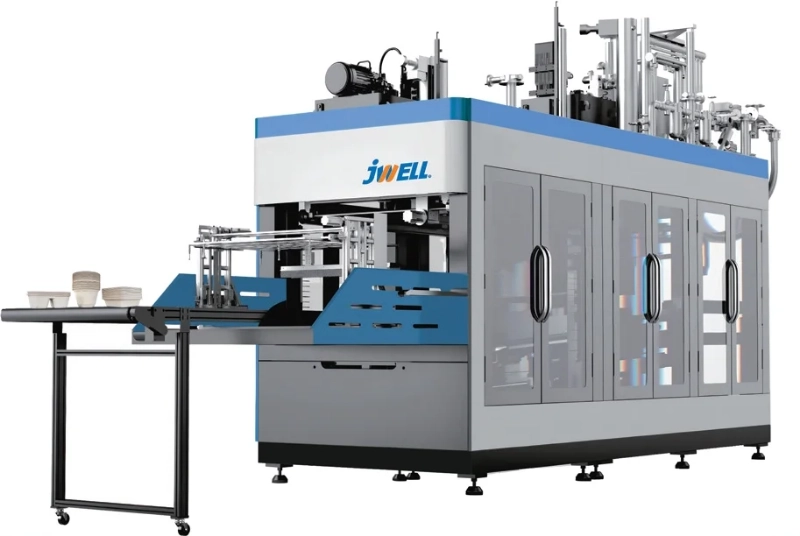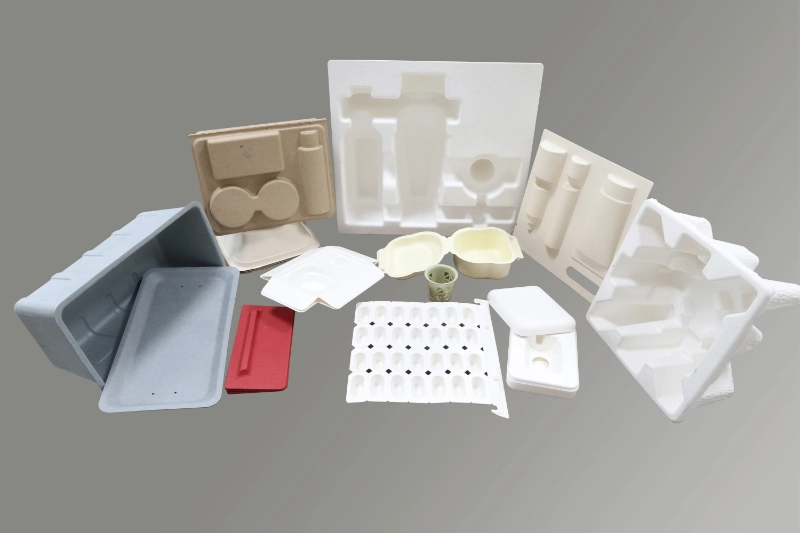- This topic is empty.
-
AuthorPosts
-
2025-07-16 at 2:42 pm #4075
The automatic pulp molding machine has emerged as a transformative solution in the modern packaging industry, driving sustainable production with its eco-friendly, biodegradable product output. In this blog post, as a high performance jwell machinery supplier, we will share the application fields of automatic pulp molding machine for sale.

Jwell Automatic Pulp Molding Machine Application Fields
1. Industrial Packaging Cushioning Materials
One of the most prominent application areas for automatic pulp molding machines lies in the industrial sector, particularly in the production of *cushioning and shockproof packaging*. These molded fiber products are used to secure and protect sensitive electronic equipment, mechanical components, industrial instruments, tools, and computers during transportation and storage. The molded packaging conforms to the shape of the product, offering optimal cushioning against shocks, vibrations, and impacts.
Automatic pulp molding machines can mass-produce complex structural components that rival or exceed the performance of plastic foam packaging. Common use cases include protective corners for appliances, molded trays for glassware and ceramics, and tailored packaging inserts for delicate or irregularly shaped items. These solutions not only reduce breakage during transit but also enhance brand value by offering sustainable, plastic-free alternatives.
2. Poultry Egg Buffer Packaging (Trays)
Egg trays are among the earliest and most widely adopted products made by pulp molding machines. With the increasing demand for safe and eco-friendly transportation solutions for poultry products, pulp-molded egg trays have become a standard across poultry farms and food distributors.
Automatic pulp molding machines can produce egg trays in various capacities — from 6-egg cartons to industrial-scale 30-egg trays — suited for the transportation of chicken, duck, goose, and other bird eggs. These trays protect the fragile eggs from cracking during handling, stacking, and long-distance shipping. Additionally, their moisture-resistant properties (achieved via post-processing) ensure product integrity under varied environmental conditions.
3. Fresh Fruit Cushioning Packaging (Pallets)
Transporting fresh fruit presents unique challenges, including susceptibility to bruising, decay, and moisture loss. Pulp-molded fruit pallets offer a practical and environmentally friendly solution by preventing direct contact and friction between individual fruits during handling and transit.
Automatic pulp molding machines are used to produce multi-cavity fruit trays and pallets for apples, peaches, avocados, pears, kiwis, and more. These trays are designed with precise dimensions and ergonomic shapes to hold each fruit snugly, minimizing movement and reducing spoilage. By improving airflow and facilitating stacking, these pallets also support efficient cold-chain logistics, which is vital for preserving freshness in large-scale agricultural exports.
4. Fresh Food Packaging Pallets
In the retail and supermarket sectors, pulp-molded trays are gaining traction for packaging fresh foods such as vegetables, meats, and seafood. These trays offer a sustainable alternative to conventional plastic or foam containers used in display cases and food shelves.
Automatic pulp molding machines are equipped to manufacture various sizes and formats of food-grade pallets that can directly contact produce or pre-packaged items. Besides being biodegradable and compostable, these trays can also be coated to resist moisture and grease, making them suitable for wet or oily food items. This has made pulp-molded food trays a popular option in the green packaging initiatives of grocery chains and convenience stores worldwide.

5. Disposable Tableware
Perhaps the most visible and socially impactful application of pulp molding technology is in the field of disposable biodegradable tableware. Automatic pulp molding machines can mass-produce lunch boxes, plates, cups, bowls, and other dining essentials using food-grade bleached pulp derived from sugarcane bagasse, bamboo, or wood fiber.
These products serve as sustainable replacements for traditional polystyrene foam and single-use plastic tableware, aligning with global regulatory trends banning non-degradable materials. In addition to being microwave-safe, leak-resistant, and strong, these molded fiber tableware items naturally decompose in landfills or composting facilities, reducing environmental pollution.
Due to the scalability and automation offered by modern pulp molding machines, manufacturers can now meet high-volume demands from airlines, fast food chains, school canteens, and event organizers without compromising on environmental responsibility or product quality.
Conclusion
The application fields of automatic pulp molding machines are expanding rapidly as sustainability becomes a priority across industries. From industrial packaging and agriculture to food distribution and everyday consumer use, pulp-molded products are delivering both functionality and ecological benefits. These machines have become an essential part of the green manufacturing ecosystem by enabling the large-scale production of biodegradable packaging solutions.
With advancements in automation, precision molding, and surface finishing technologies, the versatility of pulp molding will only continue to grow, meeting the evolving needs of diverse industries while reducing global reliance on plastic packaging. Companies investing in this technology not only future-proof their operations but also contribute to a more sustainable planet.
http://www.jwellplas.com
JWELL -
AuthorPosts
- You must be logged in to reply to this topic.